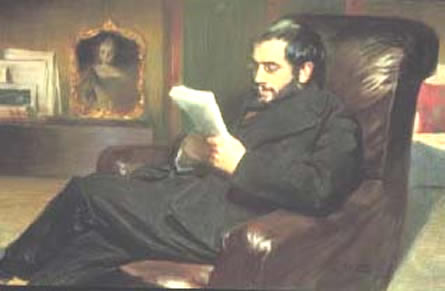|
Portrait of Benois (1898)
 Leon
Bakst (1866-1924) began his career as a kind of junior associate
of the Wanderers. By the 1890s, however, under the influence
of modern French painting, he abandoned that aesthetic.
A trip to North Africa in 1897 opened the exotic world of
the Mideast to him, and he scored his greatest success as
a designer of opulent orientalist costumes and sets for
Diaghilev's
Ballets Russes, most famously "Schéhérazade" (1910). He
was also the designer for many of the Ballets Russes most
famous ballets on classical themes, including "Daphnis and
Chloë", and Nijinsky's notorious "Afternoon of a Fawn".
After the Revolution, Bakst remained in Europe. In the late
1890s, he was one of the leading members of the so-called
World of Art group, that formed around the artist Alexandre
Benois (1870-1960),
depicted in this 1898 portrait. The painting itself, by
the way, shows Bakst's connection with the wanderer aesthetic
(compare to the portrait
of Turgenev by Perov). Leon
Bakst (1866-1924) began his career as a kind of junior associate
of the Wanderers. By the 1890s, however, under the influence
of modern French painting, he abandoned that aesthetic.
A trip to North Africa in 1897 opened the exotic world of
the Mideast to him, and he scored his greatest success as
a designer of opulent orientalist costumes and sets for
Diaghilev's
Ballets Russes, most famously "Schéhérazade" (1910). He
was also the designer for many of the Ballets Russes most
famous ballets on classical themes, including "Daphnis and
Chloë", and Nijinsky's notorious "Afternoon of a Fawn".
After the Revolution, Bakst remained in Europe. In the late
1890s, he was one of the leading members of the so-called
World of Art group, that formed around the artist Alexandre
Benois (1870-1960),
depicted in this 1898 portrait. The painting itself, by
the way, shows Bakst's connection with the wanderer aesthetic
(compare to the portrait
of Turgenev by Perov).
|
|